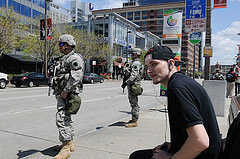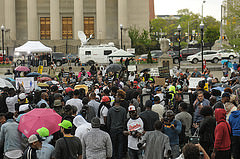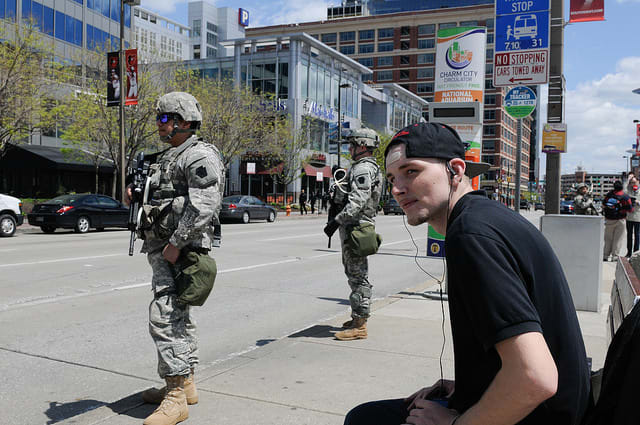Rabbi Etan Mintz is the spiritual leader of B’nai Israel Congregation, Baltimore’s oldest continually active synagogue and one of the original founding synagogues of the Orthodox Union. B’nai Israel Congregation is also located only five blocks away from City Hall in downtown Baltimore. In the week following the riots that gripped Baltimore, Rabbi Mintz sent out this email to his congregants. We urge you to read and share.

The events of this past week have shaken and rattled our community and city. What began as peaceful protests in response to police brutality devolved into widespread chaos and destruction. As is often the case, there is a fine line between the holy and unholy, between raising a voice to power and anarchy, between civil disobedience and criminal activity. The truth is that there are really two types of protests, which is what makes these days so confusing. There are local African American youth and community organizations raising a valid critique of the social inequalities and growing economic disparities in our city, and the resulting police brutality to control troubled neighborhoods. And then there are the likes of Malik Shabazz and other outside agitators, who have histories of bigotry and vitriol, coming with an agenda to stir the pot and take advantage of a fragile environment.
Immediately following Monday night’s riots, I felt a need to do something. I joined with local clergy and fellow rabbis to discuss how best to respond and heal our communities, and joined with them in relief and cleanup efforts. It became abundantly clear to me that our own community is divided. There are those focused on showing solidarity with the #BlackLivesMatter campaign. Then there are others who, as a result of the rioting, are all the more disillusioned, distant and outraged by the actions of our city’s youth.

These false dichotomies and artificial divides are illusions. Whenever I think of these tensions, I think of my dear friend Eliyahu McLean from Jerusalem Peacemakers. Eliyahu and his mentor Rabbi Menachem Froman z”tl, both resided in what is considered the settlements and with their side-curls look visibly ultra-Orthodox. And yet, Eliyahu is at the forefront of Muslim-Jewish interfaith relations. Perplexed, people often ask him if he is left wing or right wing, to which he aptly responds — “It takes two wings to fly.” The same is true here.
Are we supporters of #BlackLivesMatter? No doubt. Each person is created b’tzelem elokim, in God’s Divine image. We fail as a society when people are lacking basic necessities of proper healthcare, education and job training as others down the street indulge in excesses. Do we support our law enforcement? Of course. They faithfully protect us and venture into harm’s way on a daily basis. They are our public servants.
Instead of falling into sides and categories, let us take time as a community to mourn, introspect and to communicate. There is sadness. There is anger. There is despair. And these are all valid feelings. But sadly, Baltimore city has not had the proper opportunity to mourn for the life of Freddie Gray. And it has not had the time to introspect about the root causes of the injustices in in our city and in our society that led us to where we are today.

The Torah speaks to this in parshat Achrei Mot as it describes the aftermath of the death of the sons of Aaron. However, it was some time earlier that Aaron’s sons had died in Parshat Shmini. Why instruct Aaron so much later regarding how to move forward from this tragedy? You see, Aaron’s immediate response was silence and introspection. Only three parshiot later does God instruct him regarding how to move forward. In the moment immediately following the death of his two sons it is impossible for him to react. There needs to be time for mourning. Our sages understood that grief is a process. There is a reason that shiva begins with seven days of internal introspection to be followed by the shloshim and a year of kaddish. At this time what we need is a little more calm, a little more silent indignation, a little more listening to one another. Yes, police brutality and social inequalities are not something to be calm about. They call for moral outrage and action. But what we are seeing is that in in the eye of the storm, the forces are too strong and dangerous. In the immediate aftermath of a tragedy, there are no adequate answers. As Shimon the son of Gamliel remarks in Ethics of the Fathers: “All my life I have been raised among the wise, and I have found nothing better for the body than silence.” And most critical is that in the silent still voice after the storm, even after the media departs and the dust settles, that we make sure to continue to sound the shofar of justice. Only then do we really begin to have conversions about addressing social injustices. The same Shimon who extolled silence also taught — “The essential thing is not study, but deed. And one who speaks excessively brings on sin.” In the stages of grief, first let us make space for the mourning to take place. To take place for Freddie Gray. To take place for the social injustices and disparities in our city and in our society. Only then can we respond with wisdom, with kindness and with mercy.
This weekend, let us begin the healing by joining together as a community. I urge you to support peaceful and holy demonstration such as being organized by our friends at Jews United for Justice. I urge you to support shop owners whose stores have been looted. I urge you to give hakarat hatov, thanks, to the next officer you see on our streets protecting our city, the vast majority of whom are peace-loving individuals. This backlash no doubt impacts their morale. There is no better greater antidote to hatred than a show of unity and peace. I urge you to continue to find meaningful ways to fight for justice and equality, particularly after the dust settles. We were all created b’tzelem elokim, in God’s Divine image. The test of a society is how it treats the most vulnerable. We cannot sit comfortably when others down the block lack the basics that would afford them human dignity. In the upcoming weeks, we look forward to working as a community and with our partners to lend a hand to those in need and advocate for systemic change.
Life is more complex. It is not so black and white.
The words of this author reflect his/her own opinions and do not necessarily represent the official position of the Orthodox Union.
